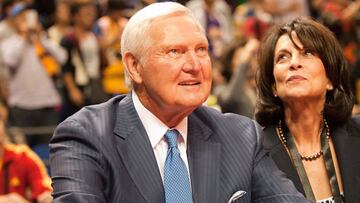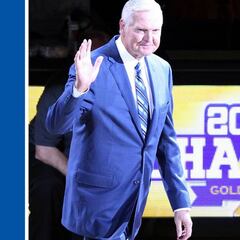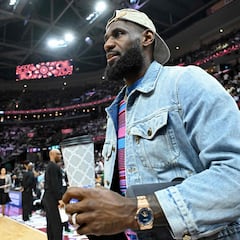Jerry West dies at 86: The Lakers legend who became ‘the logo’
The man behind the famous NBA logo has passed away at the age of 86.

Jerry West, one of the most important figures in NBA history, has passed away at the age of 86. For many, he is the logo of the NBA, as the iconic image of the competition was made from a photo of him running with the ball in a Lakers jersey, the only team he played for (1960-74) in Minneapolis and Los Angeles.
Jerry West lived a profound basketball and American life — iconic as a player, executive and looming figure in the history of the game. He was an MVP, a champion, a gold medalist, a dynasty-builder and literally the league’s logo. His loss leaves a massive void. pic.twitter.com/vE3fQc5XuE
— Adrian Wojnarowski (@wojespn) June 12, 2024
A Hall of famer as a player and as a contributor, West was a fourteen-time all-star, NBA champion in 1972 and MVP of the 1969 Finals: he was the first to win the award when it was created and remains the only person to have won it despite being on the losing side; the Lakers were beaten more than once in the Finals by the Celtics, the team that was the eternal thorn in the side of his career.
He was never able to beat them in the fight for a ring. In all, he played nine times for the title and lost eight, all to the Celtics. In ‘72, when he broke the curse, the game was against the New York Knicks.
The mythical number 44 of the Lakers, he later became a coach - a role that he did not love and left after a short while - and above all one of the most influential directors in the NBA. He was a champions eight times from the offices (six with the Lakers, two as advisor to the Warriors) and two Executives of the Year (1995 and 2004).
But his greatest achievements came on the court: he led West Virginia to the college finals and was MOP (best player) of the Final Four despite his team’s defeat in the 1969 title game. The Lakers, still in Minneapolis, selected him with the No. 2 pick in the 1960 draft.
In the franchise, with which he lived through the move to L.A. and the obsession for that title that finally came in 1972, he averaged 27 points, 5.8 rebounds and 6.7 assists (in the playoffs, 29.1, 5.6 and 6.3). He also has the best scoring average in a playoffs: 46.3 points. Before his image was the logo of the league, he was known as Mr. Clutch for his ability to score decisive baskets in crucial moments of the games.
Nobody has lost more NBA Finals than Jerry West. The only person with seven is Elgin Baylor, his also legendary teammate in the Lakers who did not win any of them. West was one of the best point guards of all time. Baylor, the precursor of the aerial game of first Julius Erving and then Michael Jordan, was considered the best small forward who had ever stepped on a basketball court until Dr. J and Larry Bird arrived. Surely, the two usually go more unnoticed in the historical rankings because of that avalanche of defeats, almost all of them against Bill Russell’s Celtics.
That’s why Jerry West is the only player with the MVP of a Finals lost by his team and why he ended up hating green, which reminded him of his defeats in so many fights for the ring. Some of them were, frankly, inexplicable: seven until 1970, six of them against the Celtics (in eight years) and the last one against the Knicks.
The last one seemed to leave a team that included West, Baylor and, as of 1968, Wilt Chamberlain, one of the strongest weapons of mass destruction that ever walked onto the basketball court, all mortally wounded.
Related stories
It goes without saying that the 1972 title, the Lakers’ first in California was one of the most important days in Chamberlain and West’s careers. Baylor had retired just at the start of that season, when the Lakers posted what was then the best record ever (69-13) with a streak of 33 straight wins that no team has ever matched. That season, West averaged 25.8 points and nearly 10 assists. In the playoffs, 22.9 and 8.9. His best statistical season, however, was 1964-65: 40.6 points per night.
After a career in which he also won an Olympic gold medal (Rome 1960), he was the legendary executive at the Showtime Lakers and the person who brought about another golden era for the franchise when, in a single week, he acquired Kobe Bryant (July 1996) thanks to the trade for Vlade Divac agreed before the draft and with Shaquille O’Neal as a free agent. In 2000 he left the Los Angeles franchise and then moved on to Memphis Grizzlies, Golden State Warriors and Los Angeles Clippers, the last franchise with which he was linked.


Complete your personal details to comment